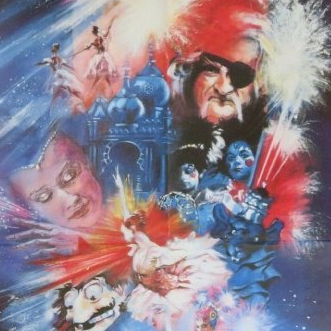The Mind of Mr Soames
Terence Stamp takes the opportunity to loll about and not talk in complete sentences while get paid for it. …Again!

US poster | Columbia Pictures
1970 — UK/USA
An AMICUS PRODUCTION presented by COLUMBIA PICTURES.
Cast: TERENCE STAMP, ROBERT VAUGHAN, NIGEL DAVENPORT, CHRISTIAN ROBERTS, DONAL DONNELLY, VICKERY TURNER & JUDY PARFITT
Director: ALAN COOKE
Producers: MAX J. ROSERBERG & MILTON SUBOTSKY
Screenplay: JOHN HALE & EDWARD SIMPSON
Original Work: CHARLES ERIC MAINE
Editor: BILL BLUNDEN
Cinematography: BILLY WILLIAMS
Production Design: BILL CONSTABLE
Music: MICHAEL DRESS
© Amicus Productions
Amicus Productions was a company that made several well-known British horror films in the ‘60s and ‘70s. Imagine Hammer without the budget.
Just let that combination of words sink in.
To be fair, the head honchos of Amicus would probably feel rather slighted by that line. The story goes that producer Max Rosenberg and writer Martin Subotsky first went to Hammer in the ‘50s with a pitch for a new version of Frankenstein. Hammer were all like ‘hmm, yes’ and showed them the door, before going and making their own ding-dang-ol’ version of Frankenstein that essentially created format that would be the company’s bread-and-butter over the next decade or so. More than a bit miffed, the pair formed Amicus in order to make their own damn films on what-was-now Hammer’s turf. Due to budgetary concerns, the bulk of their stuff tended to have contemporary settings, but perhaps the most obvious difference is that many of their films follow an anthology format with a handful of largely unconnected shorts strung together with a generally fairly thin frame narrative featuring the leads of each short where it probably turns out they’re all dead and in purgatory or something.
This is not one of those films. Apparently, Amicus decided towards the end of the ‘60s they wanted to branch out into ‘real’ films, this is ostensibly one of those. This is perhaps less obvious than their other notable forays into worthiness which included adaptations of Margaret Drabble’s The Millstone (as ‘A Touch of Love’ (1969)) and Harold Pinter’s The Birthday Party (1968), likely due to a combination of the original works being better known and them not having the genre trappings seen here. See, The Mind of Mr Soames is, at least nominally, a sci-fi story. Based on a somewhat obscure novel from 1961 by Charles Eric Maine; I have no familiarity with the source material whatsoever, nor the author for that matter (general opinion of his work seems to skew ‘meh’); supposedly Amicus bought the film rights after they failed to get the rights to the somewhat similarly themed Flowers to Algernon. So, yes, while the film is technically a genre piece like much of Amicus’ output; they’d already made a bunch of sci-fi films at this point; this differs in that it’s a largely serious bit of soft science fiction as opposed to the B-movie-ish kind that isn’t really concerned with the science element at all. With that said, the story’s interest in the soft sciences pretty much precludes much of what anyone would associate with ‘science fiction’ beyond the most basic premise, and so to that end it seems like its status as a sci-fi movie might be up for debate.
In the apparent present day (i.e. the late ‘60s, early ‘70s), the eponymous Mr John Soames lies comatose in a psychiatric hospital; as a result of a difficult birth that no one seems willing to elaborate on, he’s been in said coma since said birth some thirty years ago. But it’s fine, you know, they totes give him massages so his muscles don’t atrophy (and also, y’know, develop, because I think you have to develop muscle before it can atrophy), that’s how this works, right? Anyway, I guess someone’s annoyed at him taking up a bed or something, as the doctors take it upon themselves at this point to wake him up. And wake him up, they do! Of course, though, his is the mind of an infant, but the psychologists have plans to turn him into a functioning member of society at rapid speed. (Fortunately, all those totally legit massages mean they can skip the boring physiotherapy stage of his habilitation.) Not necessarily the same plans, mind you. Yes, it’s an exciting story of child development theories! Circa the ‘60s. Like, the film’s central thesis of which methodology is better doesn’t seem hugely controversial by today’s standards (spoiler: not the ultra-strict and regimented programme), but bear in mind that we’d only recently had things like Harry Harlow’s fascinating-and-also-evil experiments on rhesus monkeys at that point.
(Incidentally, if Soames is supposed to be thirty, the odds of him having no surviving family seem remote. They’re never mentioned however. Interpret that as you will.)
So why bother with this film of dated theories on child development? Terence Stamp, that’s why. Fresh from Pasolini’s Teorema (1968) wherein he played pretty much the literal embodiment of sex, here he is playing about the least sexy role imaginable as the eponymous Soames. It’s testament to his skill as an actor that despite Soames being non-verbal for much of the film (and only really gains the conversational skill of a young child over the course of the thing) he manages to convey the character’s emotion so well with just expression and body language. He doesn’t oversell it either; there are a lot of subtle shades and changes in his performance that serve to make Soames quite fascinating to see develop. He’s also mercifully largely unsexualised, with the film mostly (though perhaps implausibly) avoiding presenting him as a sexual creature even if it does threaten to a couple of times (though according to the liner notes with the BD release the book does manage to sex him up, so that’s gross). This lack of sex appeal might be attributed to the fact that, further to being a literal man-child, he spends the bulk of the film in a onesie (a wardrobe choice reportedly picked by Stamp himself), though I’m sure someone out there is all about that image.
To tie into that needlessly long intro on the origins of Amicus Productions, part of the story’s appeal to the producers may have been the Frankenstein-ish nature of the narrative, with its mentally childlike but physically adult protagonist thrust into an unfeeling world and all that jazz (indeed, it sounds like the novel upon which the film is based leans quite heavily on this idea at points). The film isn’t especially heavy handed about this, and for all its child development considerations is unable to provide a satisfactory solution for the problem that Soames creates.
The problem is that the film doesn’t really do much to explore this theme and it doesn’t entirely feel like its ambiguity is always intentional. The characters are often a bit thinly sketched and the plotting never seems to take the risks that it could. An interesting point I once saw reckoned predictability in plots is not inherently bad; it suggests that the story has a consistent logic. Of course, though, there’s predictability and predictability. The Mind of Mr Soames generally follows the obvious route for the plotting to take. Meanwhile despite the supporting casts apparently deeply held beliefs and opinions on Soames’ habilitation, the film doesn’t really explore why they view the matter as such. In the scheme of things, I suppose it doesn’t really matter as the film is an interesting watch; more than the sum of its parts. A film equivalent of a novel of ideas, even if it often feels like it only really scratches at the surface.
At time of writing, The Mind of Mr Soames isn't even listed on JustWatch and doesn't appear to be on any major streaming service. Sorry, kids. Alternatively, physical copies are reportedly available for rent via Cinema Paradiso.
The film presently has a 15 rating (last being submitted in 2018), with the BBFC citing "mild violence". If you want some fun evidence of societal change, on its original release, the film received the then-new-fangled 'AA' rating (in fact, the classification date on the BBFC's website is given as 01/07/1970, the day of the rating's introduction), the de facto equivalent of a 15.



